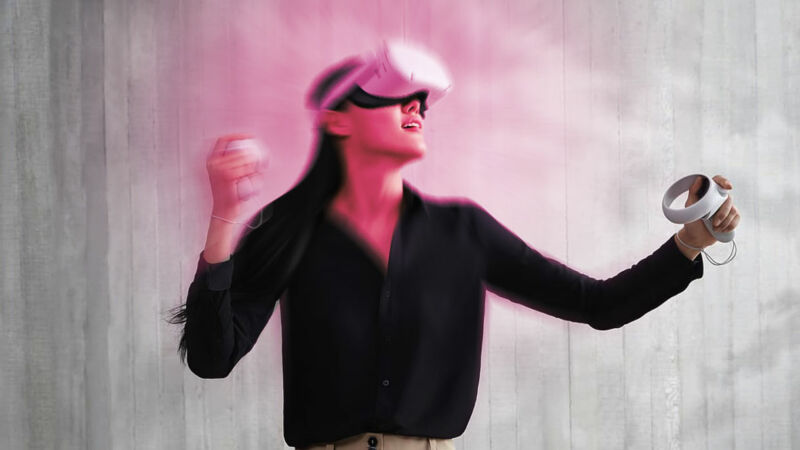
Facebook’s VR division is recalling every single foam facial liner included in its Oculus Quest 2 VR headset in North America, the company confirmed, as part of a US CPSC recall notice. An investigation found 5,716 reports of “skin irritation” from system owners, along with “approximately 45 reports of consumers that required medical attention.”
The recall applies to “about 4 million” customers, which is the closest public estimate we’ve yet seen for Quest 2 hardware sales in the US since the system went on sale in late 2020. Since this estimate includes standalone purchases of face covers, it’s not an exact measure, but considering how ho-hum the default face masks are, we’re confident that few people were rushing to buy duplicates of it, as opposed to superior third-party options.
In light of the recall, Facebook is also taking the extreme measure of pausing all Oculus Quest 2 sales in North America, in addition to offering silicone-liner replacements to all existing owners. This news comes after UploadVR confirmed Facebook’s plans to launch a new price point for the VR system in August: $299 for a 128GB model (up from 64GB), along with the existing 256GB model at $399. Facebook now says that the August 24 relaunch will mark the system’s return to retail outlets with an updated silicone face cover packed in by default.
One of many serious Quest 2 downgrades
Consumer complaints began piling up shortly after the system’s October 2020 launch regarding rashes, burning sensations, red facial marks, and hives experienced while wearing the VR headset. These complaints often said that the users hadn’t felt particularly warm temperature-wise, so they were not building up sweat within the VR headset’s goggle portion. (My own review of Quest 2 mentioned so many complaints that I barely touched on my disdain for the cheap-feeling foam face liner, which felt like a serious downgrade from the Quest 1’s fabric. Quest 2 is marked by a number of downgrades from its predecessor, arguably to scrape back savings to make room for its spec upgrades.) By early 2021, Facebook posted a minor acknowledgment of the issue and described the problem as affecting “about 0.01 percent” of system owners.
That Facebook post was updated in April to confirm that the company had detected in the liners “trace substances” that “were already at levels below the industry standard,” without clarifying what those substances were or what industry standard it was referencing. Did Facebook mean “as compared to commonplace facial gear like ski goggles,” or did the company mean “with regard to virtual reality masks,” an industry that has yet to receive decades of product-review scrutiny?
In either case, Facebook pledged to “change our process to reduce [trace substances] further,” but the company didn’t remove the material entirely from the liner that makes constant contact with users’ faces. That action may have still run afoul of the CPSC’s rules about appropriately labeling anything that counts as an “irritant,” which the US agency defines as something that “causes a substantial injury to the area of the body that it comes in contact with. Irritation can occur after immediate, prolonged, or repeated contact.” Facebook has yet to clarify the exact source of the existing face mask’s irritation—including whether the culprit was the foam itself or any chemical treatment sprayed onto the foam ahead of being shipped to customers.
Tuesday’s recall follows a related disappearance of Oculus Quest 2 headsets across European Union nations in May, which Facebook confirmed was related to an EU commission looking into the system’s foam face mask amid users’ reports of irritation and worse. The headset has not yet returned to European retailers as of press time.
Thanks to Quest 2’s forced integration with Facebook accounts, it stands to reason that Facebook could begin targeting all Quest 2 owners with notices or advertisements about facial irritation, rashes, and hives across all connected Facebook services, including Instagram and Whatsapp. However, Facebook says it will contact affected users about this week’s recall via email, or they can go directly to a recall-related site and request a replacement of their own.
https://arstechnica.com/?p=1783373

